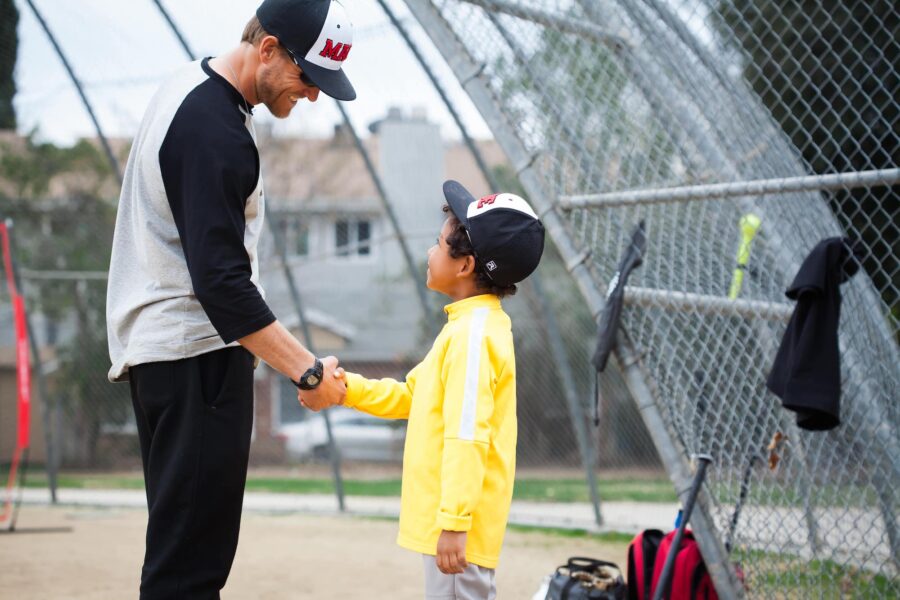At MADE Baseball, we understand the necessity of teaching the principles of being a champion…
Baseball is a challenging sport with lots of tremendous highs and lows. It’s a beautiful game that teaches our youth how to deal with adversity from a young age. So why is it that so many of us these days are trying to make it something it isn’t? Why is it so often that we are trying to create situations to keep our young players from experiencing this authentic part of the game? For example, if a player in coach pitch swings and misses five times, why do we let them hit off of a tee? Why are they not going back to the dugout after a strikeout? It’s not tee-ball anymore, it’s coach pitch…the next step. It’s time for them to start feeling real feelings and dealing with reality. Yes…even if they are six years old. In fact, because they are six years old. This is the time that the foundations are really beginning to be laid.
Everyone Strikes Out.
Anyone who knows anything about baseball knows that a hitter in the big leagues that hits for a .300 average in any season is considered pretty darn good. In fact, if he does that for his whole career, it’s just about guaranteed that he is going to make it to the
Hall of Fame. We know that means that he is “failing” 7 out of 10 times he goes up to the plate. Of those seven attempts, chances are, if he’s amazing, he’s striking out a minimum of two times, or one out of five.
The highest career batting average in history is Ty Cobb, who hit .366 over an amazing 24 year career. (Something no one will probably ever do again considering just about every team in the MLB now has at least one pitcher who throws 100mph+ and most pitchers who throw at least mid 90s. Ty Cobb’s simply won’t exist anymore. And he still got out 6.34 out of every 10 times he attempted to get a hit.
Now, most young ball players probably know a guy on the LA Dodgers by the name of Cody Bellinger, right? He’s pretty good, right? At the time of this post, he’s actually considered the best player in the world based on his MVP season in 2019. How many times did he strikeout in his 2019 MVP campaign?
He struck out 108 times in 661 plate appearances. That’s one out of every 6.12 chances at the dish…and
he is literally the best on the planet. How about another household name that your young champion might know about, Mike Trout? Well, he was the other MVP on the planet and he struck out even more frequently,
at a clip of one out of every five times at bat. Now Belli had 47 dingers and Trout had 45 jacks, so it’s not like they don’t hit bombs. They actually hit just about everything, and the hit it a mile.
But they still strike out….ALL THE TIME.
Stop protecting them and let them experience it.
As parents and youth coaches it can be challenging to give the cold hard truth to our young ones in the heat of the moment, especially if they have the puppy dog face of sadness. It’s not easy to see them take a strikeout to heart and know they feel bad…or is it? It’s not that big of a deal. They will survive and they will be better in the long run because of the fact that you are being real with them now when it hurts. This isn’t just baseball guys, these are the building blocks for life. The adverse situations that these young ball players are experiencing are helping them turn from caterpillars into butterflies. If you don’t allow them to struggle, they will not become the beautiful creature that we know exists inside of them.
So how do we prevent them from feeling bad when they let their team down? We don’t.
What we do is lay a foundation. We lay it early and we lay it strong. Of course they won’t totally understand it all when we talk to them in the pre-season and let them know that striking out is part of the game, but they will get it as the tough times ahead eventually happen. Once we’ve planted that seed that they will strike out, and that it won’t feel good, but that it is part of the game, we must then consistently remind ourselves that it’s the beautiful part of the game because it tests our young players ability to respond to adversity and decide what they are going to do about it. I promise, if you skip the pre-season talk and fail to set the groundwork clearly and properly, and you subsequently make it as easy as possible on them all the time, it’s always going to be an uphill battle, a little messy, and possibly highly discouraging and path altering.
If we coddle and protect, and try to make them always feel good, they simply won’t grow as strong as if we just give it to them straight and tell them to go back to the dugout if they strikeout.
Embrace it.
We need to embrace the strikeout, especially if it’s our own kid. We don’t need to comfort it. We just need to teach them how to wear it. We also need to absolutely ensure that our young players understand that it is NOT OK to cry or pout when they strike out and it is NOT OK to get angry and throw a tantrum either. There is just too much of this happening and we all know the kid who does one or the other. Often times it is the same kid who does both, depending on his mood…meanwhile his parents are on their cellphone the whole game not even knowing what happened, let alone the fact that he is acting a fool in the dugout. Go figure. #notchampion.
Parents – this is a direct reflection of you. This is NOT OK. You will NEVER see Belli or Trout cry or pout or freak out. And I promise you never saw them do that when they were younger either. If they struck out you know what they wanted? Revenge. And they wanted it fast and furious. Now, if a big league strikes them out, what they normally do is immediately go back to the drawing board, watch the film, talk to their hitting coach or teammates, look at the scouting report, and
figure out how it won’t happen again on their next at bat. And they are likely gonna go hit a dinger off the guy who just made them look silly. #evenkeel #champion #mindset
This is just one example of how we can approach teaching our youth baseball players from a young age. Don’t get me wrong, I’m not saying that you should teach your player to be happy about a strike out. I’m saying to teach them to think like problem solvers and figure out what is next. What is my job now? What can I do on the next at bat to make sure I don’t have that happen again? How can I go play defense and help my team get back in the dugout again so we can hit again!? NOT – Who is there to comfort me and make me feel better because I just struck out? Who is there to blame? Who is there to listen to my excuses?
It’s all about laying a foundational mindset and approach to how we think about the so-called “failure.” Those who bounce back quickly and make adjustments are the leaders and the champions, and this is a seed that most definitely can be planted at even the youngest ages.
You must to be clear and consistent.
At MADE Baseball, we do
private baseball lessons EVEryday, and we have seen everything. As a staff we have played, coached, been coached, and taught baseball for over a combined five decades, and every time we add another champion
professional baseball instructor to our squad, that number grows. We know what it takes to create the proper mindsets in our players in order to help them understand how to respond. We realize that this is the number one priority, far in front of teaching a kid that he needs to keep his elbow up or follow through. Obviously, the physical mechanics are key, but they are nothing without the mental mechanics.
We must be CLEAR. We must set our expectations. We must circle back to those expectations consistently and steadfastly, without wavering on them or making exceptions. This goes for all levels of the game. This doesn’t mean that we are super serious. In fact, our number one rule at MADE Baseball is “Always Have Fun.” We are quite goofy about these expectations a lot of the time, but we know how to draw the line and maintain a level of personal accountability in our players. It is a dance that takes a mindfulness of individual personalities and an awareness of how to get through to each of those different types of personalities.
We are mentors first, teachers second, and coaches third.
Laying the foundation. 22 questions.
We have created a list of 22 questions that we suggest you ask your players at the beginning of each season. Take the time to sit them down as a team and go over these questions clearly. We encourage you to go back and reiterate each of these questions during each week, game, and/or practice.
These questions are like pushups for the mind. They must be trained.
You always have to keep circling back and being consistently clear about your expectations and your message. We are sure it will benefit your players to know the answers to as they start to play this game. If you are a coach, we recommend you start the season with sitting your team down and asking them these questions, one by one.
1) What’s the first rule?
Always have fun. If we aren’t having fun, its time to do something else. This goes for any level of the game, up to the major leagues. It is a GAME. It is meant to be fun. Even when we are doing things that are challenging and pushing us, we must find the fun in them.
2) Whats the second rule?
Always do your best. If you are not doing your best, find the door. I don’t care if you are six years old. My expectation for you will be clear, and it will be that you always give your best. There is not a second option, and it is crucial that you understand this at a young age if you expect to live up to the amazing potential that I know lives inside you.
3) How do you respond to a coach?
“Yes coach or yes sir.” Or, “no coach, or no sir”. There is no uh-huh, or yep, or yeah in MADE Baseball. Answer your coach with confidence and certainty, chest out, shoulders back and down, eyes on the coach, so he knows you are listening and paying full attention to what he is saying.
This is not so the coach is your boss or dictator. This is so you understand how to give respect so that you can earn respect. This goes for all walks of life; athletics, school, home, or people on the street. “Thank you, sir. Yes, sir. I appreciate that, sir. After you, sir.” Watch how the world opens up when you take on this simple habitual mindset.
Man, if you can teach this one to the six year olds and not let them get away with not saying it, your life will be much easier. Mark my words.
4) How can you be a great teammate?
Lead yourself. Always stay positive and do your best to look at the bright side. Maintain a never give up energy in the dugout, regardless of the situation. Meet your team mates at the dugout to pick them up, whether they produced or they did not produce. Give high fives and be a problem solver. Help each other by talking about things you might pick up that the other team is doing that can give you an advantage. Understand that everything you do is a reflection of you, your coach, your family, and the teammates that surround you.
5) How do you shake your coaches hand or anyone’s hand?
You “shake it to break it.” Not literally “break it”, but you better not have a wet fish. Control what you can control and make a great first impression. Even if you are 6 years old.
This is something that can easily be learned and should never be missed. Dad, you have to teach your son how to shake a man’s hand from a young age.
As a coach, this is easy for me to teach a new player. I simply show them both versions, the strong hand shake, and the wet fish. Then I say, if I shook your dad’s hand like that(the wetfish), he would probably be doubting me as a coach before I ever got the chance to teach you anything. It’s too valuable of a life skill to pass on teaching. Teach your six year old. Start today. Have hand shake practice with him. Make him feel like he hurt your hand. He will love it.
6) What’s does team work do?
Makes the dream work. EVEryday. Duh. No teamwork, no champions. No champions, no championships. No championships, whats all the hard work for. Participation is great…but we are here to get better and we are here to win.
7) What is a habit?
Something you do repeatedly. Excellence is not an act, it is a habit. Create great habits. Teach your young ones the meaning of the word “habit” early and often. Get them in the habit of creating great habits. Our lives are MADE up of an accumulation of our habits.
8) Does winning matter?
Of course it does. And it’s detrimental to teach your team that it doesn’t. But what is rule number one? Always have fun. Did they have fun in the game? Probably not if they got their butts whooped. Did they do their best? If I’ve been clear about the two rules then I trust they did their best and of course I’ve got their back. They are my guys. I only need to ask them, “Did you guys give everything you had and not give up?” If they can all say, “Yes Coach,” then they are all always winners in my book. The loss is on me. I should have lead them better. When my team loses, its on me, when they win, its on them. That’s how coaching works.
Winning is absolutely not everything, not at any age. The most important thing is that my team left everything on the field and they did not give up…when you do that, you are connected. When you do that, its always fun. When I know they gave everything they had, I know they grew, individually and together as a group.
Remember…everyone strikes out. We choose to grow together as a team and we choose to learn from it. So….”I’ll see you guys at practice! Now, get out of here and go tell your parents thank you and then go take a shower because you guys smell like dirty, stinky ball players!”
Six year olds…10 year olds…college players…major leaguers. This attitude goes for all levels. The major leaguers are the ones who always thanked their parents, and their parents always asked them the same question I asked them…”Did you give it everything you had?”
9) What is your most valuable tool/asset?
Your attitude. Attitude is everything. Results are today, response is forever. Strengthen your attitude every way that you can. Develop it. Shape it. Challenge it. Master it.
10) What is the strongest muscle in your body?
Your brain, because it is what controls all of the actions you take in the game. Ask them about this one anytime they are not using their brains. You will start to see all the mental mistakes go away at a faster pace.
*NOTE: It is actually your HEART…but from a younger age, we preach it is the brain because as coaches we find this helps kids think on their toes and hold themselves more accountable to make smart decisions on and off the field. As you get older and understand your passions and what drives you, your heart is ultimately what we believe you should strengthen and prioritize as the strongest muscle in your body. Work from your heart and your brain will always have your back.
“Your heart is king and your brain is queen, put them together and you have a champion kingdom.”
-Coach Isaac Hess
11) What happens when you take care of your gear?
Your gear takes care of you. If you leave your gear out in the rain, if you act like it doesn’t matter, if you mistreat it…the baseball gods will inevitably punish you and you will not be dropping bombs, flashing leather, or throwin’ missiles nearly as much as if you treated your gear like it was part of your family.
This one is easy…and its a karmatic science that you better not mess with. The baseball Gods WILL ZAP YOU, I promise.
12) What happens to the pain?
It goes away. When you get hit by a pitch or a ball in the infield and it hurts bad, remember to stay as calm as you can. Breath. Be tough. If you have to cry, cry. If you don’t have to cry, hold back the tears. But don’t start balling just because you want attention.
Sometimes it takes longer than others, but the pain always goes away, and normally it only takes 5 minutes or less in most situations. Staying calm is a super power.
13) What happens when you look good?
You feel good.
14) What happens when you feel good?
You play good. You gotta look good, to feel good, to play good. This is a MADE Baseball equation. Don’t show up looking like a guy who didn’t look in the mirror to make sure he looked sharp before he showed up to the field. You would never see Cody Bellinger or Mike Trout looking like anything less than CRISP and PROFESSIONAL. Aspire to look like an MVP, EVEryday.
This means, shirt tucked in, YES – EVEN MY SIX YEAR OLDS. Especially my six year olds. Why the heck do so many coaches let their young ball players leave their shirts untucked?? “Oh Isaac, come on he’s only six” Ah, gotcha…I guess that means we can’t take one teaching minute and tell him that we expect him to tuck his shirt in. He watches the Dodgers, right? Tell him to show you one Dodger at any point through out the season where he doesn’t have his shirt tucked in. FIGURE IT OUT and STOP MAKING EXCUSES FOR HIM. TEACH HIM…and then hold him accountable. Don’t continue the practice until he tucks it in. He will figure it out, I promise. And eventually, he will take ownership and pride in his appearance.
Also, take a practice to teach your young guys how to tie their shoes!! Literally, take a full practice. The value of having your young players know how to tie their shoes for the rest of their lives and feel great about the fact that they can do it themselves will far outweigh the value of the 10 swings each kid got while the dad coach who didn’t know how to run the
private team practice let all the other kids sit around in the field doing circles and catching flies with their shirts untucked and their shoes untied. This stuff is simple but we make it so hard.
15) Who strikes out?
Everyone. Even the best players in the world. They strike out A LOT.
Pound this one into their heads and don’t make it easy on them. Teach them that it is part of the game and remind them that it is their responsibility to respond like a champion and learn from it.
16) What happens if you strike out?
You learn from it. You don’t cry and you don’t pout when you strikeout. You surely don’t throw your helmet and you don’t blame the umpire. You learn from it and figure out what you need to do to be better in the next at bat. There is no time for whining and crying in baseball, and it simply isn’t acceptable.
Again, even the best players in the world strike out, don’t act like you are better than the very best in the world and that you should never strike out.
17) Do umpires make bad calls?
All the time. Literally every game, even in the big leagues.
Parents – lay off the umpire. Umpires are indicative of life. They aren’t fair. Moaning and groaning from the stands just because your kid got rung up on a pitch that was clearly a ball is Bush League and bad practice. Just hope for the best, and roll with the punches. The umpire is probably an 18 year old kid, or a 55 year old beer belly adult. Keep things in perspective and teach your player to work around bad calls and adjust.
18) Is it fair when the umpires make bad calls?
No, sometimes it is not fair at all, but its part of the game and it’s part of life. You deal with it. Hope for the best you can out of an umpire, but understand and remember that he is human and he is doing his best also. Find ways to use it to your advantage as well as make adjustments.
19) Do we let umpires determine our abilities?
Never. We
Figure it out and we respond like the champions we are. For the advanced players, buttering the umpires up and asking them how they are, shaking their hand and introducing themselves, and expressing their personality a bit to them will often result in positive calls. Remember, they are human. Find ways to gain an advantage. Again, this is life.
20) How do you take a knee?
Like a boss. 90 degrees. Everytime. No matter what.
If your knee gets tired, figure it out and switch your knees. If your knee gets tired again, switch them again, and so on. Don’t sit on your butt until the coach says to relax. Even if you’re six.
Coaches – don’t let them sit on their butt. They will be fine, and you will be creating unity and discipline in your squad.
21) How do you catch the ball?
With two hands. Every time, as much as possible. Especially when no one is watching. Master your fundamentals and take pride in them. Don’t lolligag and think you’re too good to use two hands. If you do, the baseball Gods will get you when you’re least expecting it. I promise.
22) What is MADE?
MADE is a reminder to be a champion and build your mindset EVEryday. It is a reminder that you must make your path. You must co-create your reality. MADE is a mantra, and the mantra is the medicine.
Motivation, Appreciation, Dedication, EVEryday. MADE is a lifestyle.
These are the core elements that we incorporate into our style as coaches. We have many more that come out over time, but these cover a great deal of the ground work. I hope these give you some insight, encouragement and motivation to consider incorporating some of these teaching and coaching techniques into your repertoire.
The key is being clear and starting with laying the groundwork from a young age. Once the foundation has been laid, build on it with consistency and always circling back to your core principles. Check in often. Reiterate the principles every week and/or practice or game in some facet. Test your players on them. They will love it.
At MADE Baseball, our coaching staff offers coaching clinics for youth baseball leagues around the country. We encourage a setting of parents, coaches, parent coaches, board members, players, and anyone else that has any involvement in the league to attend these clinics in the beginning of a season in order to create cohesive community, understanding, and clear expectation that can be reflected from all sides in order to give the youth players the best possible chance of developing in a healthy, disciplined, and fun way.
How do you #GetMADE?
Contact us today if you are interested in having us a do a coaching clinic for you or consulting with any of your baseball minds. We live for this and we love our role in the baseball world of making an impact on the positive mindset of our youth baseball community.
Share this post with a player, parent, or coach that you know that could benefit. We need to keep things in perspective and allow struggle to happen if we want our caterpillars to turn into butterflies.
Thanks for reading.
-Coach Isaac
Post Views: 15,242




